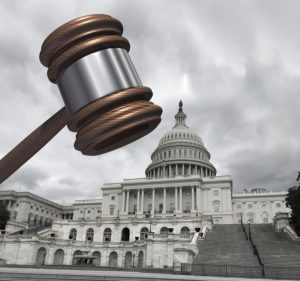
At LV Criminal Defense, we understand the grand jury process. While your attorney is not allowed to address the grand jury during official proceedings, you do have the right to have a lawyer with you. You also have the right to be notified about the grand jury proceedings and you are entitled to a transcript of the proceedings if you are indicted. Our experienced legal defense team can help you to determine how to respond to the grand jury, whether to present evidence, and what your options are for beginning the process of building a criminal defense.
When a prosecutor convenes a grand jury to determine if a case against you should move forward, this is a serious matter. Due to the time and expense involved in convening a grand jury, prosecutors often impanel a grand jury to hear a case only if they believe a serious crime was committed or if there was a crime committed that is getting lots of public attention. Either way, you need to know your rights and develop an effective strategy for responding to charges. Call today to speak with a Las Vegas defense lawyer who can help you begin building a strong legal strategy.
The powers and duties of grand juries are set forth in Chapter 172 of Title 14 of the Nevada Code. N.R.S. 172.105 through N.R.S. 172.271 specifically address the authority that grand juries have, as well as establishing requirements for how evidence is presented to a jury and when a jury should indict.
N.R.S. 172.105 makes clear that a grand jury can be convened to determine if an indictment should be handed down for “all public offenses triable in the district court or in a Justice Court.” However, the grand jury can only be convened to determine whether to indict when a crime was allegedly committed within the territorial jurisdiction where the grand jury is empaneled.
When a grand jury is convened, N.R.S. 172.155 makes clear it should indict a defendant only if the evidence that is presented establishes probable cause both to believe a crime has been committed AND probable cause to believe the defendant was the one who committed it. A defendant will need to apply for a writ of habeas corpus in order to challenge the indictment and argue that the evidence was not actually sufficient to create probable cause to indict. Writs of habeas corpus are not often granted, as judges usually feel it is best for the case to proceed to trial where a jury can decide if the evidence is sufficient to convict.
Nick Wooldridge has a long track record of representing clients accused of serious federal and state crimes in Nevada.
A grand jury is different than the jury that presides over a criminal trial and determines guilt or innocence. Once a grand jury has determined there is probable cause to indict, the case moves forward to be decided by a trial jury (which is also called a petit jury).
There are strict rules for the types of evidence that a prosecutor may present to a grand jury. N.R.S. 172.135 indicates that a grand jury may only hear evidence from a witness that has been produced and sworn in to testify before them, or that is furnished by legal documentary evidence. The grand jury is also entitled to invite any person to speak before the grand jury to provide testimony, as specified in N.R.S. 172.145.
There are, however, some limited exceptions to the requirement that a grand jury can only hear evidence presented to them in person. For example, affidavits may be used under circumstances described in N.R.S. 172.137, which includes situations where a witness is more than 100 miles from the location of the grand jury proceeding. Live testimony may also be presented to a grand jury via audiovisual testimony when conditions established in N.R.S. 172.138 exist. These conditions include a witness who lives more than 500 miles from the proceeding, or who is unable to testify live in front of a grand jury due to a medical condition. Only certified videographers must be used and the video testimony must be preserved and transcribed. The witnesses who give testimony also must be sworn in and sign a written declaration.
In grand jury proceedings, generally the prosecutor is the only one presenting evidence. As N.R.S. 172.145 makes clear, a grand jury is not bound to hear evidence that a defendant presents. However, a defendant is entitled to submit a statement detailing whether a preliminary hearing was held and whether evidence presented at the preliminary hearing was considered insufficient to move forward with charges against the defendant. If the defendant prepares a statement, it must be presented to the grand jury. A district attorney is also required to provide any evidence to the grand jury that the prosecutor is aware of that could explain away the charge.
If you are notified a grand jury has been convened and you are facing the possibility of indictment, you should act quickly and assertively. You need to fight for your freedom, and develop an effective strategy for trying to avoid a criminal conviction. LV Criminal Defense will help you to decide whether to prepare a statement or testify before a grand jury and will assist you in beginning to prepare for a criminal trial in case the grand jury hands down an indictment.
When I initially met with Mr. Wooldridge, he took the opportunity to sit and go over my problem with me. He described details in my case which he found disturbing and explained why he I should have him on my side.
To learn more and to get a skilled and committed legal team on your side, call LV Criminal Defense today to speak with a Las Vegas defense lawyer who is ready to help you.